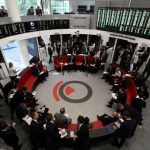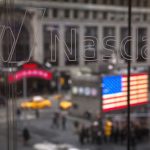
Elon Musk’s clash with President Donald Trump over new 50% tariffs on Chinese imports has put the tech industry on high alert.
The world’s richest man is pushing back as sweeping protectionist measures threaten US-China supply chains, raising costs for manufacturers and consumers alike.
Tesla, which has lost more than 38% of its value this year, now faces a worsening demand outlook in China, a key market.
As pressure mounts, tech leaders are reportedly forming informal lobbying efforts behind closed doors, trying to persuade the administration to adopt a softer stance.
But internal divisions and key personnel shifts complicate the road ahead.
Tesla down 38% as demand drops
Tesla shares fell over 2.5% on Monday to $233.29, a significant drop that reflects mounting investor concerns.
Analysts have reduced Tesla’s price target from $550 to $315, citing declining demand and growing reputational issues in China.
The company’s reliance on Chinese production and sales makes it particularly vulnerable to the latest wave of tariffs, which could directly impact pricing and profitability.
Tesla’s market struggles come in parallel with CEO Elon Musk’s increasing political activity.
Once a high-profile supporter of deregulation, Musk has used his platform to criticise Trump’s latest tariff measures while simultaneously trying to influence policy decisions.
His dual role as business magnate and political interlocutor has placed Tesla at the centre of a broader geopolitical and economic dispute between Washington and Beijing.
Tech leaders lobby to ease tariffs
Behind the scenes, several prominent business leaders are reportedly lobbying for more moderate trade policies.
According to The Washington Post, there have been efforts to form an informal coalition aimed at influencing Trump’s decision-making.
Investor Joe Lonsdale and other Musk allies are said to have reached out to administration officials, including Vice President JD Vance.
However, internal dynamics within the Trump administration are shifting. Commerce Secretary Howard Lutnick, previously seen as sympathetic to Silicon Valley, has now become a staunch proponent of protectionist policies.
His presence, alongside trade adviser Peter Navarro, has created obstacles for those seeking policy moderation.
Musk’s limited success in lobbying efforts was evident when he posted on X in response to the US trade representative’s defence of the tariffs.
Though previously critical, Musk commented “Good points,” suggesting a potential recalibration of his public tone.
Still, the larger implications for Tesla and the wider tech industry remain unchanged.
Tariffs raise long-term consumer costs
One of the most significant criticisms of the new tariffs is their long-term effect on American consumers.
Kimbal Musk, a Tesla board member and Elon Musk’s brother, described the tariffs as a “permanent tax” in a post on X.
Who would have thought that Trump was actually the most high tax American President in generations.
Through his tariff strategy, Trump has implemented a structural, permanent tax on the American consumer.
Even if he is successful in bringing jobs on shore through the tariff
5.0K
Reply
Copy link
He noted that the new policy has led to a structural change in pricing that directly affects end-users in the US.
Kimbal’s remarks came just weeks after he praised Trump for showcasing Tesla at a White House event.
The shift underscores how swiftly political goodwill can erode under economic pressure.
Peter Navarro, the architect of the tariff strategy, has been a particular focus of Musk’s criticism.
Musk recently questioned Navarro’s qualifications, pointing to his economics PhD from Harvard in a dismissive X post.
Here is Peter Navarro explaining the tariffs and contrary to the paid fake expert class that is usually on corporate media, Peter Navarro has a PhD in economics from Harvard.
He’s also not going to lie to you about what is happening to a globalist agenda.
Notice how he uses
View replies
17.2K
Reply
Copy link
Replying to @DefiyantlyFree
A PhD in Econ from Harvard is a bad thing, not a good thing.
Results in the ego/brains>>1 problem.
5.0K
Reply
Copy link
While Navarro has not commented publicly, the White House defended its team, reiterating that Trump is the final decision-maker.
Musk steps back amid deepening divide
Over the weekend, Musk spoke with Italy’s Deputy Prime Minister Matteo Salvini, promoting a future without tariffs and greater labour mobility across borders.
He advocated for a “zero-tariff situation” between the US and Europe and suggested freer movement for skilled professionals globally.
Musk, who is expected to step down from his advisory role within Trump’s circle, has consistently opposed trade barriers.
His companies — including Tesla — have global operations that are directly affected by tariffs, making him one of the most vocal corporate figures in this policy debate.
The timing is critical. With a presidential election looming, and US-China tensions flaring, the rift between Silicon Valley leaders and Trump’s protectionist agenda is widening.
For Tesla and its peers, the financial impact may be immediate, but the strategic consequences could be far longer lasting.
The post Elon Musk fires back at Trump as Tesla stock slides 38% amid China tariff tensions appeared first on Invezz






